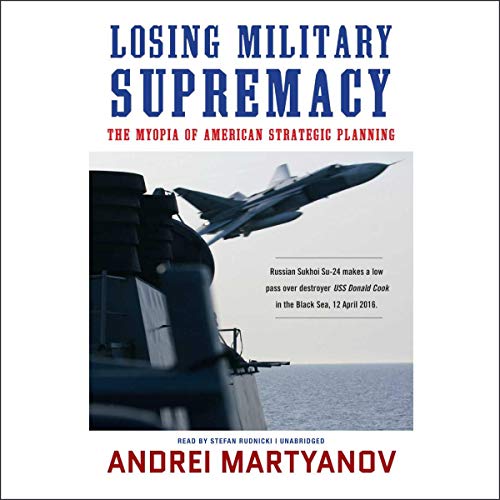
Losing Military Supremacy
The Myopia of American Strategic Planning
カートのアイテムが多すぎます
カートに追加できませんでした。
ウィッシュリストに追加できませんでした。
ほしい物リストの削除に失敗しました。
ポッドキャストのフォローに失敗しました
ポッドキャストのフォロー解除に失敗しました
Audibleプレミアムプラン30日間無料体験
¥1,700 で購入
-
ナレーター:
-
Stefan Rudnicki
-
著者:
-
Andrei Martyanov
このコンテンツについて
Time after time, the American military has failed to match lofty declarations about its superiority, producing instead a mediocre record of military accomplishments. Starting from the Korean War, the United States hasn't won a single war against a technologically inferior, but mentally tough, enemy. The technological dimension of American "strategy" has completely overshadowed any concern with the social, cultural, operational, and even tactical requirements of military (and political) conflict. With a new cold war with Russia emerging, the United States enters a new period of geopolitical turbulence completely unprepared in any meaningful way - intellectually, economically, militarily, or culturally - to face a reality which was hidden for the last 70-plus years behind the curtain of never-ending Chalabi moments and a strategic delusion concerning Russia, whose history the US viewed through a Solzhenitsified caricature kept alive by a powerful neocon lobby, which even today dominates US policy makers' minds.
This book explores the dramatic difference between the Russian and US approach to warfare, which manifests itself across the whole spectrum of activities from art and the economy to the respective national cultures; illustrates the fact that Russian economic, military, and cultural realities and power are no longer what American "elites" think they are by addressing Russia's new and elevated capacities in the areas of traditional warfare, as well as cyberwarfare and space; and studies several ways in-depth in which the US can simply stumble into conflict with Russia and what must be done to avoid it.
Martyanov's former Soviet military background enables deep insight into the fundamental issues of warfare and military power as a function of national power-assessed correctly, not through the lens of Wall Street "economic" indices and a FIRE economy but through the numbers of enclosed technological cycles and culture, much of which has been shaped in Russia by continental warfare and which is practically absent in the US.
©2018 Andrei Martyanov (P)2018 Blackstone Audio, Inc. and Skyboat Media

